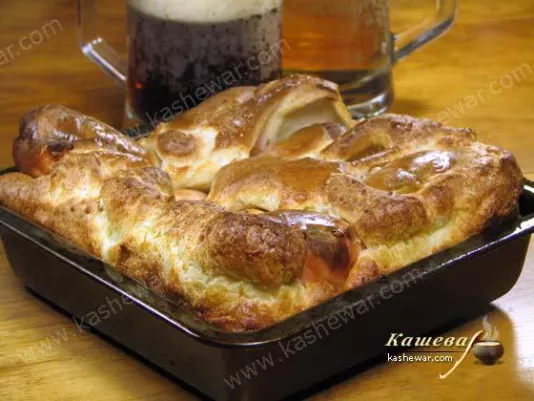Sandwiches with Red Fish and Arugula
Sandwiches with red fish and arugula – Irish recipe, rye bread sandwich with butter, capers and lemon juice.

British cuisine embodies a deep respect for tradition, simplicity in preparation, and the quality of ingredients. Over the centuries, it has evolved under the influence of the natural conditions of the British Isles, social changes, and foreign influences while maintaining its identity. British dishes rarely rely on complex seasonings or exotic ingredients – instead, they highlight the authentic flavors of vegetables, meat, fish, and dairy products. A typical meal is a harmonious combination of simplicity, heartiness, and nutrition. Each region of the United Kingdom has its own culinary features: English cuisine is known for roast beef and Yorkshire pudding, Scottish for haggis and smoked fish, Welsh for lamb and cheese, and Northern Irish for potato-based dishes. Together, they form a rich and cohesive gastronomic culture that remains closely tied to both history and daily life.
British recipes are simple, straightforward, and designed for home cooking. They are based on traditional ingredients, seasonality, and centuries of culinary practice. Some of the most well-known dishes include fish and chips, roast beef, shepherd’s pie, meatloaf, puddings, and soups made with lentils or vegetables. The British have a knack for transforming basic ingredients into nourishing, comforting meals that evoke a sense of coziness. Special attention is given to texture – the creaminess of mashed potatoes, the crispness of a roast, the tenderness of minced meat. Common cooking methods include baking, stewing, and boiling – without overprocessing, preserving the natural taste. Many dishes are passed down through generations, preserving the spirit of English country homes, Scottish villages, or Welsh farms. British recipes are not just meals – they are a part of national identity.
The full English breakfast is one of the most recognizable icons of British cuisine. It includes fried eggs, bacon, sausages, baked beans, grilled tomatoes, mushrooms, buttered toast, and black pudding. This type of breakfast is hearty, balanced, and provides energy for the entire day. In Scotland and Wales, local elements may be added – such as porridge, fish, or regional cheeses. Despite modern trends toward lighter breakfasts, the traditional version remains popular, especially on weekends or while traveling. Other common breakfast options include porridge, French toast, jam, tea, or coffee. Breakfast in the UK is not only the start of the day but also a symbol of hospitality, stability, and family comfort. Its variety allows the menu to suit any preference.
British cuisine makes extensive use of meat – beef, lamb, pork, and poultry. Roast beef, steak, meat pies, and sausages are all popular. The key to meat dishes is quality and proper cooking – usually through roasting or stewing. Fish is another essential part of the cuisine, especially cod, haddock, and salmon. It is battered and fried, baked, smoked, or added to pies and served with fresh vegetables. Vegetables, especially potatoes, carrots, peas, and broccoli, are steamed, baked, or boiled. Mashed potatoes, vegetable stews, and casseroles are also popular. A standout item is Yorkshire pudding – a savory pastry traditionally served with meat and gravy. All ingredients retain their qualities, and flavor combinations remain simple, balanced, and close to their natural state.
British cuisine is renowned for its desserts. Tea puddings, crumbles, trifles, and scones are all key parts of the tea culture. Famous examples include sticky toffee pudding, spotted dick, and apple pie – desserts with tender texture, sweet flavor, often served with vanilla sauce or cream. Baked goods play a special role in daily life: homemade bread, cakes, and biscuits are prepared regularly. Scones, in particular, have become a symbol of British afternoon tea – served with jam and clotted cream. Other favorites include fruit pies, ginger biscuits, and nut or raisin cakes. All of these create an atmosphere of warmth, peace, and leisurely enjoyment, characteristic of the British way of life.
Tea is the central beverage of British culture. It is consumed in the morning, afternoon, and evening – with or without milk, with sugar or lemon. Afternoon tea has become a national tradition, accompanied by light snacks, sandwiches, and sweets. Coffee is also present but less popular than tea. Other beverages include cider, beer, ale, gin, and whisky – each with deep regional traditions. The UK is known for its craft brewing, winemaking, and herb-infused gins. Among non-alcoholic drinks are fruit juices, lemonades, and tonics. Beverages accompany every meal and play a key role in both daily and festive rituals. British drinking culture is a blend of etiquette, tradition, and enjoyment of the moment.